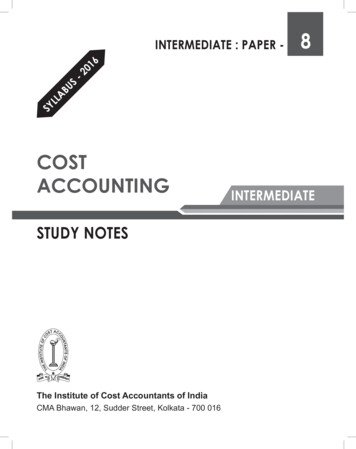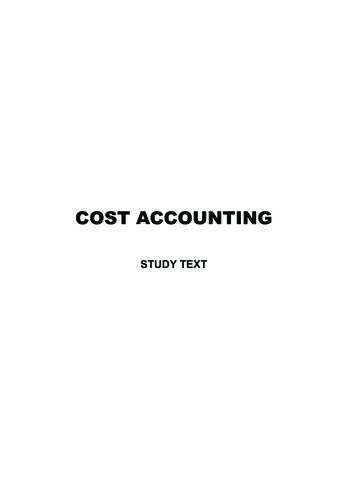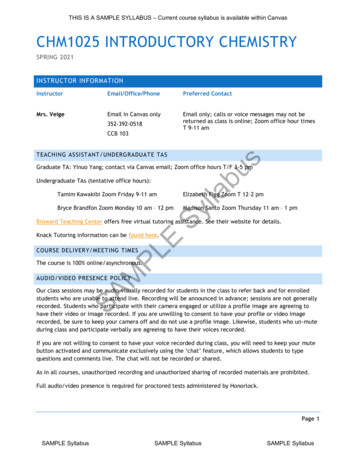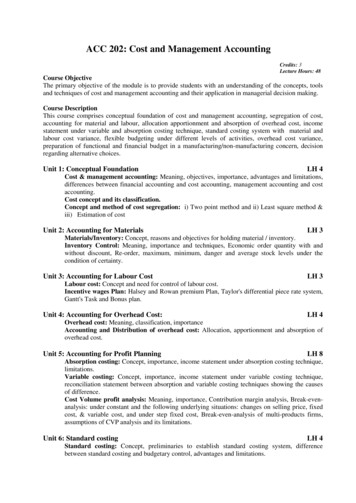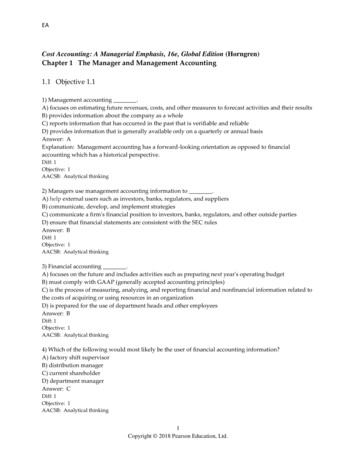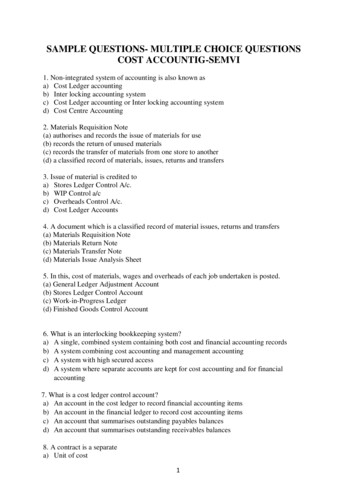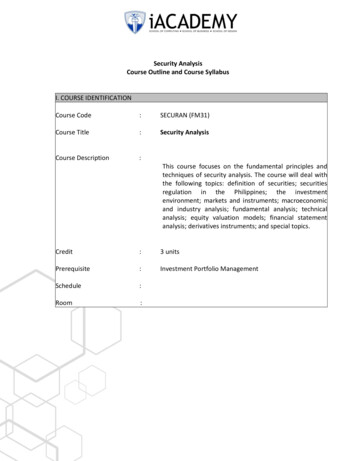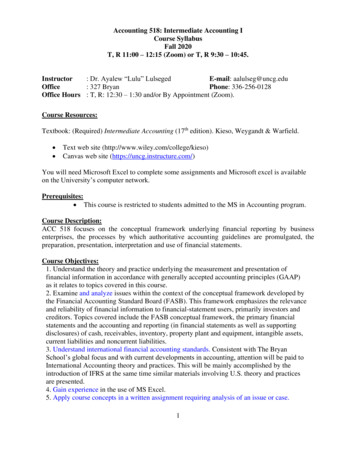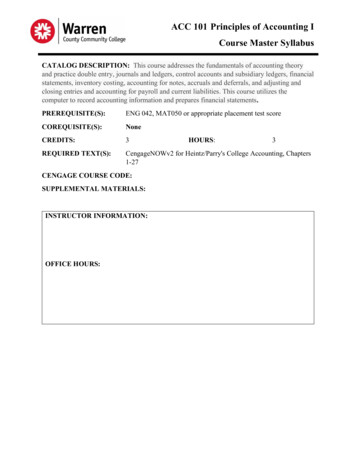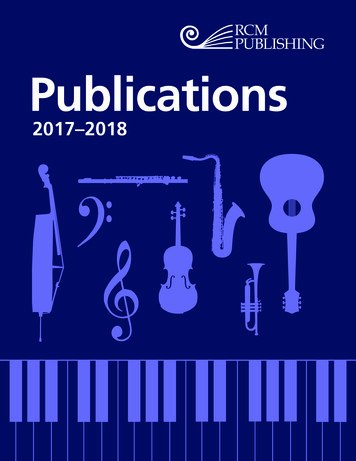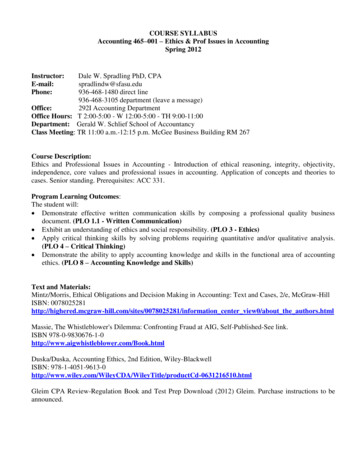
Transcription
COURSE SYLLABUSAccounting 465–001 – Ethics & Prof Issues in AccountingSpring 2012Instructor:E-mail:Phone:Dale W. Spradling PhD, CPAspradlindw@sfasu.edu936-468-1480 direct line936-468-3105 department (leave a message)Office:292I Accounting DepartmentOffice Hours: T 2:00-5:00 - W 12:00-5:00 - TH 9:00-11:00Department: Gerald W. Schlief School of AccountancyClass Meeting: TR 11:00 a.m.-12:15 p.m. McGee Business Building RM 267Course Description:Ethics and Professional Issues in Accounting - Introduction of ethical reasoning, integrity, objectivity,independence, core values and professional issues in accounting. Application of concepts and theories tocases. Senior standing. Prerequisites: ACC 331.Program Learning Outcomes:The student will:Demonstrate effective written communication skills by composing a professional quality businessdocument. (PLO 1.1 - Written Communication)Exhibit an understanding of ethics and social responsibility. (PLO 3 - Ethics)Apply critical thinking skills by solving problems requiring quantitative and/or qualitative analysis.(PLO 4 – Critical Thinking)Demonstrate the ability to apply accounting knowledge and skills in the functional area of accountingethics. (PLO 8 – Accounting Knowledge and Skills)Text and Materials:Mintz/Morris, Ethical Obligations and Decision Making in Accounting: Text and Cases, 2/e, McGraw-HillISBN: 78025281/information center view0/about the authors.htmlMassie, The Whistleblower's Dilemma: Confronting Fraud at AIG, Self-Published-See link.ISBN ook.htmlDuska/Duska, Accounting Ethics, 2nd Edition, Wiley-BlackwellISBN: eyTitle/productCd-0631216510.htmlGleim CPA Review-Regulation Book and Test Prep Download (2012) Gleim. Purchase instructions to beannounced.
Course Requirements:AssessmentCase briefsMid-TermCorporate Governance PaperWhistleblower CaseWhistleblower PaperFinalClass 0 - 700560 - 629490 - 559420 - 489 420ScaleABCDFCase Briefs: You will submit the case briefs using the instructions provided on Blackboard. You mustsubmit the cases grouped by assignment date via your Blackboard assignment box by 11:00 a.m. of the daythey are due. Late submissions will not be allowedMid-Term Exam: The Mid-Term will cover Chapters 1-6 in the Mintz/Morris book. There will be nomakeup exam. If you miss this exam, your final will count double.Corporate Governance Paper: You will be assigned to a group to prepare a “white paper” on CorporateGovernance.Whistleblower Case Study: Gordon Massie the author and subject of The Whistleblower's Dilemma:Confronting Fraud at AIG will lead a Socratic case study presentation on his experiences as awhistleblower. More information will be forthcoming, but your grade will be a function of your in-classparticipation and a written memo, which must be turned in via your Blackboard assignment box.Final: The final will consist of CPA exam-style questions prepared by Gleim Publishing and will cover thematerial found in the AICPA Code of Professional Conduct and the material covered in Duska/Duskatextbook.Participation: Your participation grade will be a subjective evaluation of your overall contribution to thecourse, including attendance, in-class discussions, and timely submission of required work.Course Calendar:See attached schedule.Attendance Policy:Regular class attendance is expected and strongly encouraged. Please make plans to attend every class andto arrive on time, ready to give full attention to every session. Missing class for any reason may jeopardizeperformance on exams and assignments. While in class, students are expected to conduct themselves in aprofessional manner. Professionalism includes regular attendance, proper dress, participation in classdiscussions, civil conduct, and ethical behavior, etc. Please ask if you are unsure what constitutesprofessional conduct in a particular situation. If a student is consistently late, seen texting and/or visitingwith other students during the class lecture, the participation portion of the grade will be reduced at theinstructor’s discretion.Academic Integrity (A-9.1):Academic integrity is a responsibility of all university faculty and students. Faculty members promoteacademic integrity in multiple ways including instruction on the components of academic honesty, as wellas abiding by university policy on penalties for cheating and plagiarism.
Definition of Academic Dishonesty:Academic dishonesty includes both cheating and plagiarism. Cheating includes but is not limited to (1)using or attempting to use unauthorized materials to aid in achieving a better grade on a component of aclass; (2) the falsification or invention of any information, including citations, on an assigned exercise;and/or (3) helping or attempting to help another in an act of cheating or plagiarism. Plagiarism is presentingthe words or ideas of another person as if they were your own. Examples of plagiarism are (1) submitting anassignment as if it were one's own work when, in fact, it is at least partly the work of another; (2) submittinga work that has been purchased or otherwise obtained from an Internet source or another source; and (3)incorporating the words or ideas of an author into one's paper without giving the author due credit.Please read the complete policy at:http://www.sfasu.edu/policies/academic integrity.aspWithheld Grades Semester Grades Policy (A-54):Ordinarily, at the discretion of the instructor of record and with the approval of the academic chair/director,a grade of WH will be assigned only if the student cannot complete the course work because of unavoidablecircumstances. Students must complete the work within one calendar year from the end of the semester inwhich they receive a WH, or the grade automatically becomes an F. If students register for the same coursein future terms the WH will automatically become an F and will be counted as a repeated course for thepurpose of computing the grade point average.Students with Disabilities:To obtain disability related accommodations, alternate formats and/or auxiliary aids, students withdisabilities must contact the Office of Disability Services (ODS), Human Services Building, and Room 325,468-3004 / 468-1004 (TDD) as early as possible in the semester. Once verified, ODS will notify the courseinstructor and outline the accommodation and/or auxiliary aids to be provided. Failure to request services ina timely manner may delay your accommodations. For additional information, go tohttp://www.sfasu.edu/disabilityservices/.Doing Well in This Class:Unprofessional Behavior: Rude behavior, which includes: coming late to class; not turning off phones;sending text messages; listening to an iPod; reading love notes; or carrying on personal conversations, willreduce your grade. There is also a minimum dress code. For men, this means no hats or displays ofunderwear. Women will follow the "Three B" rule.Laptops Or Other Gizmos: The use of a laptop (or any kind of computer) during class without my expresspermission is prohibited. If you need one for note taking, you must get advance approval, and you mustagree NOT to use the wireless feature during class. Moreover, if your gizmo use proves to be disruptive,you must discontinue using it. If an emergency develops that requires you to stay in touch with someoneoutside the classroom, you will need to leave the class.Drop/Withdrawal: You should refer to the Schedule of Classes for information on Registrar's website forthe University’s policies on drops and withdrawalBriefing Cases: Probably the biggest reason some students do not perform well in this course is becausethey get behind on doing the case briefs. Here’s a tip: You do not have to wait until the assignment date todo the briefs.
Blackboard: From time to time, materials or assignments will be posted to the Blackboard web page for thisclass. It is your responsibility to get your mySFA account up and running before coming to class. YOUMUST SEND ALL EMAILS PERTAINING TO THIS COURSE VIA BLACKBOARD SITE FOR THISCLASS! Do not even think about sending a class-related email to my campus email address.Time Management: Studying accounting is not a spectator sport. Doing well in this course requires morethan studying the textbook and taking lecture notes.Thinking like an accountant takes time. When you signed up for this course, you made an impliedcommitment to put forth the required effort and time. If upon reflection, you foresee a problem honoringthis commitment you made to yourself, please see me immediately.The final requirement for your success is communication. I cannot read your mind. If you are having aproblem, you must communicate your concerns to me on a timely basis.Reading The Textbook: One of the implied goals of a college education is learning how to learn. While yourfuture employers will provide some training, they typically expect you to hit the ground running.Knowing how to read a textbook is part of this education. The goal is to get the most out of the book in theleast amount of time. In your case, "getting the most" means doing well on the exams. When you read achapter for the first time, your plan should be to cover the material that has the greatest likelihood ofshowing up on the exams.Fortunately, every chapter begins with a list of "Learning Objectives." Every question in the publisher’s testbank will tie to one or more chapter objectives. Your study plan, thus, should focus on the chapterobjectives. Further, because repetition is your friend, each chapter has a summary explanation of allobjectives. Finally, before putting lead (or electronic bits) to paper, you should always visualize theoutcome. Once you have an idea where you want to go, the process of getting there will go much faster.Repeat to Remember – Remember to e.com/watch?v xO oEGHWSMU&feature relatedhttp://www.youtube.com/watch?v repeat-to-remember/The Big Picture: You need to understand the difference between values and principles. Values are beliefs. Aprinciple is a fundamental truth. You may believe in the death penalty, while I might not. Our differentviews on the death penalty are values. However, we both agree on the principle of, “Thou shalt not kill.” Inpractice, values are similar to laws because they can be subject to interpretation depending on the facts.Ethical principles, however, represent a higher standard than laws. This means that just because somethingis legal, this does not necessarily mean it is ethical.The second point is ethics cannot be taught. At this point in your life, you either subscribe to ethicalprinciples or you do not. However, this course will teach you how to make ethical decisions. The ultimatechoice will be up to you.
Rusche College of BusinessSyllabus AddendumProgram Learning Outcomes:Program learning outcomes define the knowledge, skills, and abilities students are expected to demonstrate upon completion of anacademic program. These learning outcomes are regularly assessed to determine student learning and to evaluate overall programeffectiveness. You may access the program learning outcomes for your major and particular courses athttp://cobweb.sfasu.edu/plo.html.General Student Policies:Academic Integrity (A-9.1)Academic integrity is a responsibility of all university faculty and students. Faculty members promote academic integrity in multipleways including instruction on the components of academic honesty, as well as abiding by university policy on penalties for cheatingand plagiarism.Definition of Academic DishonestyAcademic dishonesty includes both cheating and plagiarism. Cheating includes but is not limited to (1) using or attempting to useunauthorized materials to aid in achieving a better grade on a component of a class; (2) the falsification or invention of anyinformation, including citations, on an assigned exercise; and/or (3) helping or attempting to help another in an act of cheating orplagiarism. Plagiarism is presenting the words or ideas of another person as if they were your own. Examples of plagiarism are (1)submitting an assignment as if it were one's own work when, in fact, it is at least partly the work of another; (2) submitting a workthat has been purchased or otherwise obtained from an Internet source or another source; and (3) incorporating the words or ideasof an author into one's paper without giving the author due credit. Please read the complete policy athttp://www.sfasu.edu/policies/academic integrity.asp.Withheld Grades Semester Grades Policy (A-54)Ordinarily, at the discretion of the instructor of record and with the approval of the academic chair/director, a grade of WH will beassigned only if the student cannot complete the course work because of unavoidable circumstances. Students must complete thework within one calendar year from the end of the semester in which they receive a WH, or the grade automatically becomes an F. Ifstudents register for the same course in future terms the WH will automatically become an F and will be counted as a repeatedcourse for the purpose of computing the grade point average.Students with DisabilitiesTo obtain disability related accommodations, alternate formats and/or auxiliary aids, students with disabilities must contact theOffice of Disability Services (ODS), Human Services Building, and Room 325, 468-3004 / 468-1004 (TDD) as early as possible in thesemester. Once verified, ODS will notify the course instructor and outline the accommodation and/or auxiliary aids to be provided.Failure to request services in a timely manner may delay your accommodations. For additional information, go ble Student BehaviorClassroom behavior should not interfere with the instructor’s ability to conduct the class or the ability of other students to learnfrom the instructional program (see the Student Conduct Code, policy D-34.1). Unacceptable or disruptive behavior will not betolerated. Students who disrupt the learning environment may be asked to leave class and may be subject to judicial, academic, orother penalties. This prohibition applies to all instructional forums, including electronic, classroom, labs, discussion groups, fieldtrips, etc. The instructor shall have full discretion over what behavior is appropriate/inappropriate in the classroom. Students whodo not attend class regularly or who perform poorly on class projects/exams may be referred to the Early Alert Program. Thisprogram provides students with recommendations for resources or other assistance that is available to help SFA students succeed.August 26, 2011
Acct 465 - Accounting Ethics - Spring 2011 - Tentative Schedule @ December 15, 2011(Changes to the schedule are possible during the semester; it is your responsibility to attend class to get announced changes)Date01/19TopicSemester plans and expectations01/2401/26Principles v. Values/Ethical Template/Brief Case 1-1Chap 1 M&M Ethical Reasoning1-1, 1-2, 1-301/3102/02Chap 1 M&M Ethical ReasoningChap 2 M&M Professional Judgment1-3, 1-4, 1-5, 1-61-7, 1-8, 1-9, 1-1002/0702/09Chap 2 M&M Professional JudgmentChap 2 M&M Professional Judgment2-1, 2-2, 2-32-4, 2-5, 2-602/1402/16Chap 2 M&M Professional JudgmentChap 3 M&M Corporate Governance2-7, 2-8, 2-93-1, 3-2, 3-302/2102/23Chap 3 M&M Corporate GovernanceChap 4 M&M AICPA Code3-5, 3-6, 3-74-1, 4-2, 4-502/2803/01Chap 4 M&M AICPA CodeChap 5 M&M Auditing4-6, 4-8, 4-105-1, 5-5, 5-903/0603/08Chap 6 M&M SOXMid-Term Exam M&M Chapters 1-66-3, 6-8, 6-903/1303/15Spring BreakSpring Break03/2003/22DD&R-Appendixes A & B-SOX & IMADD&R-Chap 8-CFOs03/2703/29DD&R-AfterwordM&M-Chaps 7 & 804/0304/05Corporate Governance PaperEaster04/1004/12Whistleblower LawsWhistleblower Case04/1704/19Whistleblower PaperWhistleblower Paper Due04/2404/26AICPA Code of Professional Conduct & TSBPA RulesDD&R-Chap 4 & 5-AICPA Code of Conduct05/0105/03DD&R-Chap 5 & 6-AICPA Code of ConductDD&R-Chap 6, 7 & 10-AICPA Code of Conduct05/08Online Final-AICPA Code of Conduct Tuesday 10:30 a.m. to 12:30 p.m.Major Case 4, Pg. 468; HSBC Pgs. 401-402 App 2
COURSE SYLLABUS Accounting 465-001 - Ethics & Prof Issues in Accounting Spring 2012 Instructor: Dale W. Spradling PhD, CPA E-mail: spradlindw@sfasu.edu Phone: 936-468-1480 direct line 936-468-3105 department (leave a message) Office: 292I Accounting Department Office Hours: T 2:00-5:00 - W 12:00-5:00 - TH 9:00-11:00 Department: Gerald W. Schlief School of Accountancy
